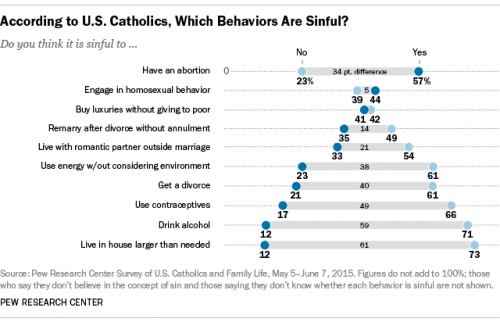One of the major contributions of political scientist Benedict Anderson is the idea of an “imagined community”: a large group of people connected not through interaction, but by the idea that they are part of a meaningful group. In his book on the idea, he wrote:
It is imagined because the members of even the smallest nation will never know most of their fellow-members, meet them, or even hear of them, yet… it is imagined as a community, because, regardless of the actual inequality and exploitation that may prevail in each, the nation is always conceived as a deep, horizontal comradeship. I suppose the idea might apply as well to religions.
Last week was a special week for American Catholics. The Pope’s visit to the U.S. was energizing, arguably intensifying the connection Catholics feel to their religion and, by extension, each other. But what, really, do Catholics have in common?
I don’t know, but agreement on what is sinful is not one of them. A Pew Research Center survey of Catholics reveals, instead, quite a lot of disagreement. Some Catholics don’t believe in the concept of sin at all and the remaining don’t always agree on what is sinful.
According to the results of the survey, for example, there is considerable disagreement as to whether abortion, homosexual behavior, hoarding wealth, divorce, unmarried cohabitation, and harming the environment are sinful. Moreover, plenty do not ascribe to some aspects of Catholic doctrine: only 17% of Catholics, for example, think that using contraception is sinful.
So, what does it mean to be Catholic?
Anderson might argue that they are simply an imagined community: a group of strangers with widely divergent views and life circumstances who feel the same despite all the reasons to feel different.
Lisa Wade, PhD is an Associate Professor at Tulane University. She is the author of American Hookup, a book about college sexual culture; a textbook about gender; and a forthcoming introductory text: Terrible Magnificent Sociology. You can follow her on Twitter and Instagram.

Comments 15
Benjamin Bias — October 1, 2015
I don't know what the chart is trying to say. Would the largest 'gap' in views be when 50% say Yes and 50% say No, a 0 point difference? Why is it highlighting the cases where there is a consensus on an issue (mostly yes or mostly no) as being the biggest division in the community?
acutia — October 1, 2015
Any such survey of a denominational group should be required to keep noting where the sample group are from. What I mean is that the results of the survey don’t give you a picture of what Catholics think, but only what *US* Catholics think.
Jack H — October 1, 2015
I can't help but feel that there's some kind of missing-the-point about trying to judge how Catholics form a community by asking the above set of questions. I mean, the Church certainly has official teachings about some (not all) of the matters raised, but they're hardly the core of the Catholic Christian tradition, for all that they might be matters currently in the news. I would hazard a guess that the Catholic community might generally regard itself as bound together by matters of fundamental Christian belief (eg. Trinity, Incarnation, afterlife) and sacramental life, with somewhat less importance laid on agreeing on environmental policy.
It's not that these disagreements aren't significant (the disparity between the Church hierarchy and the average US lay Catholic on contraception is very revealing), but that it might miss the true source of community feeling amongst Catholics by focussing on something that might actually seem minor or a matter of personal preference to those questioned. What the survey needs is a supplementary option for each question asking 'how significant do you think this matter is to your identity as a Catholic?'.
Rhkennerly — October 1, 2015
"Moreover, plenty do not ascribe to some aspects of Catholic doctrine: only 17% of Catholics, for example, think that using contraception is sinful."
I used to think I could read a chart, but it appears to me either this statement is wrong or the "no" /"yes" tags have been switched on the chart.
Has it been too long a week for me, or is something wrong here?
Heywood Youbuzzoff — October 1, 2015
Perhaps we would know what it means if a link to the actual study was posted (as I require for all of my students)...
Heywood Youbuzzoff — October 1, 2015
Are sociologists an "imagined community"?
Galen — October 2, 2015
It's been a while since I read Anderson, but I think it's a serious mistake to imply that an "Imagined Community" is somehow fake, or to use the term pejoratively. It is "imagined" in the sense that it exists as a mutually constructed conceptual entity. So of course Catholicism is an imagined community--that fact is independent of the degree to which Catholics actually hold shared beliefs.
It's also worth considering the poll itself from the Imagined Communities perspective: it's a tool that can be used by various groups to exert control over the community. Members of Catholicism can use it to try to enforce the boundaries of the community and to try to police community behavior. And outsiders can use it to try to undermine the legitimacy of the community. Note that this is a survey of American Catholics conducted by an American organization focused on the areas of Catholicism where one might expect the greatest diversity in America on issues that _appear_ central to Catholic identity. I'm reminded of the chapter on the tools of colonial power "Census, Map, Museum."